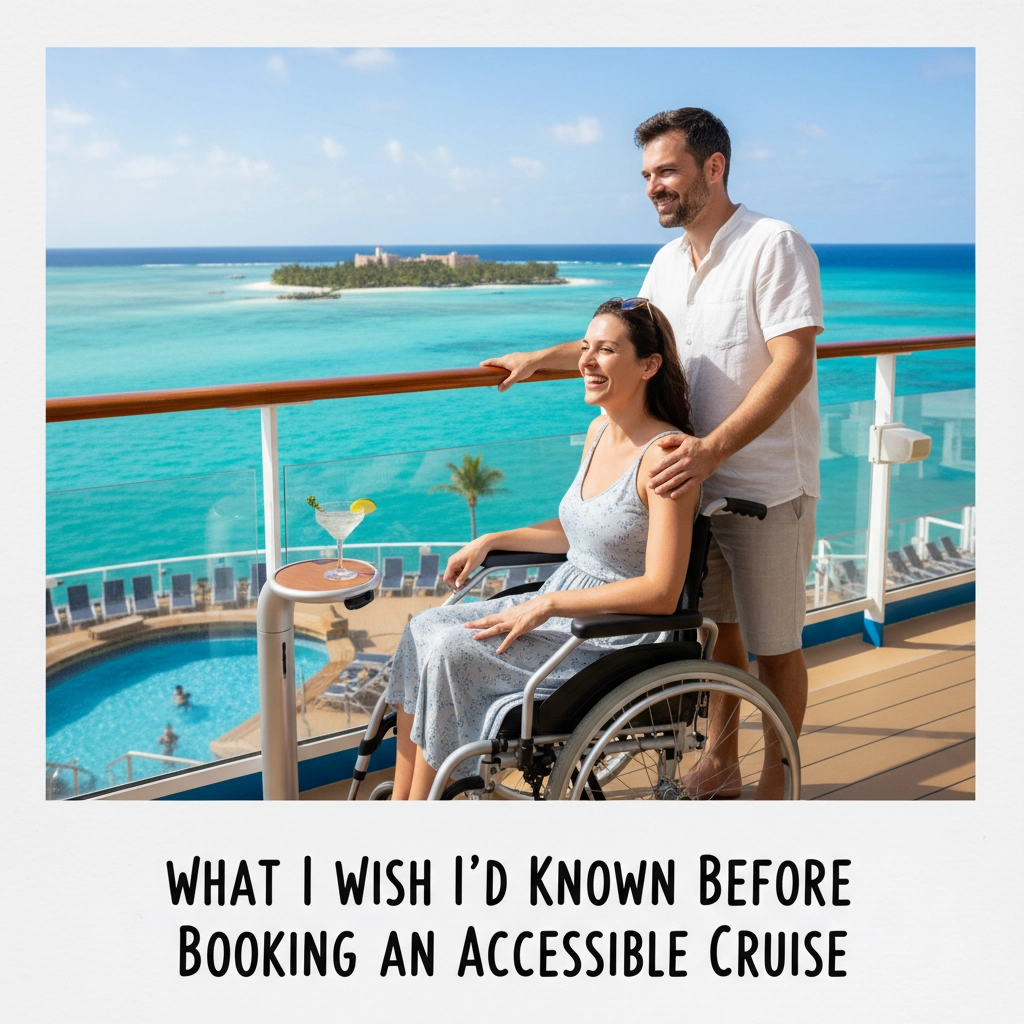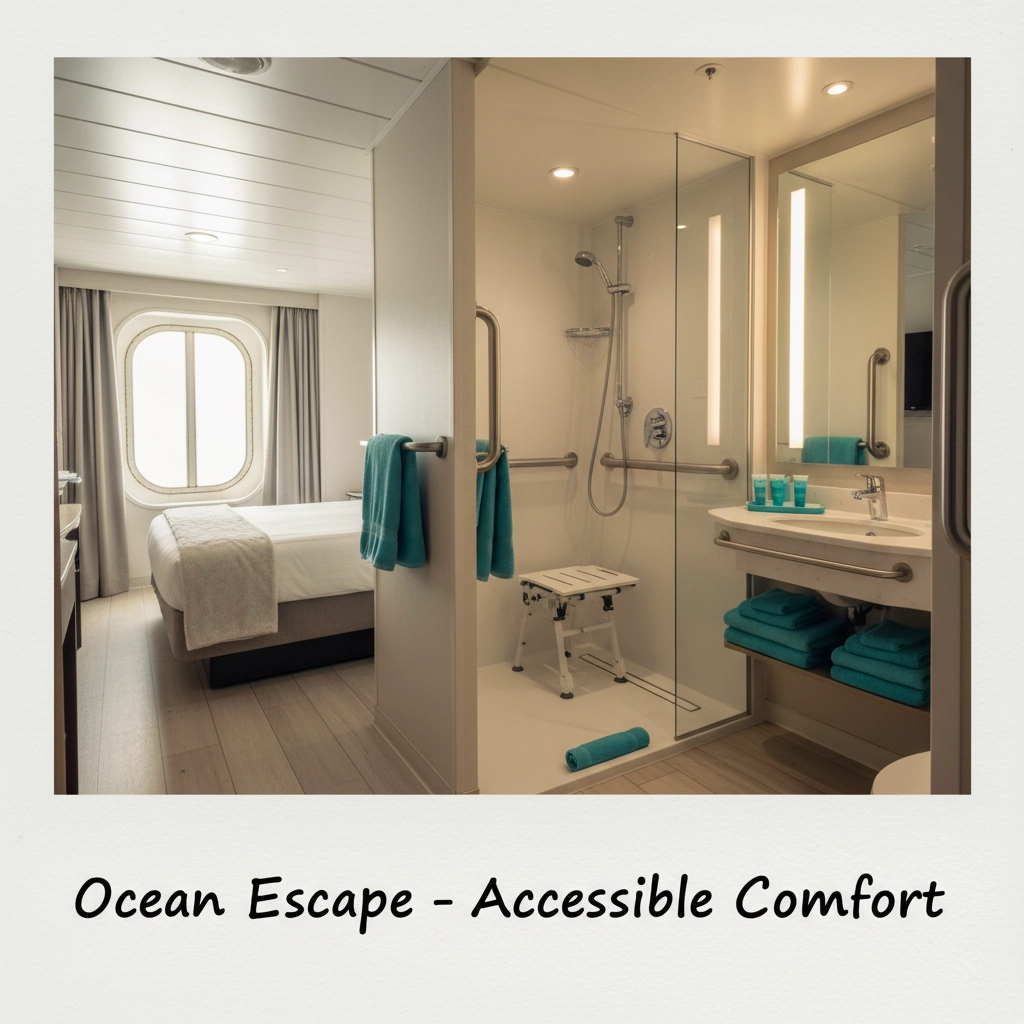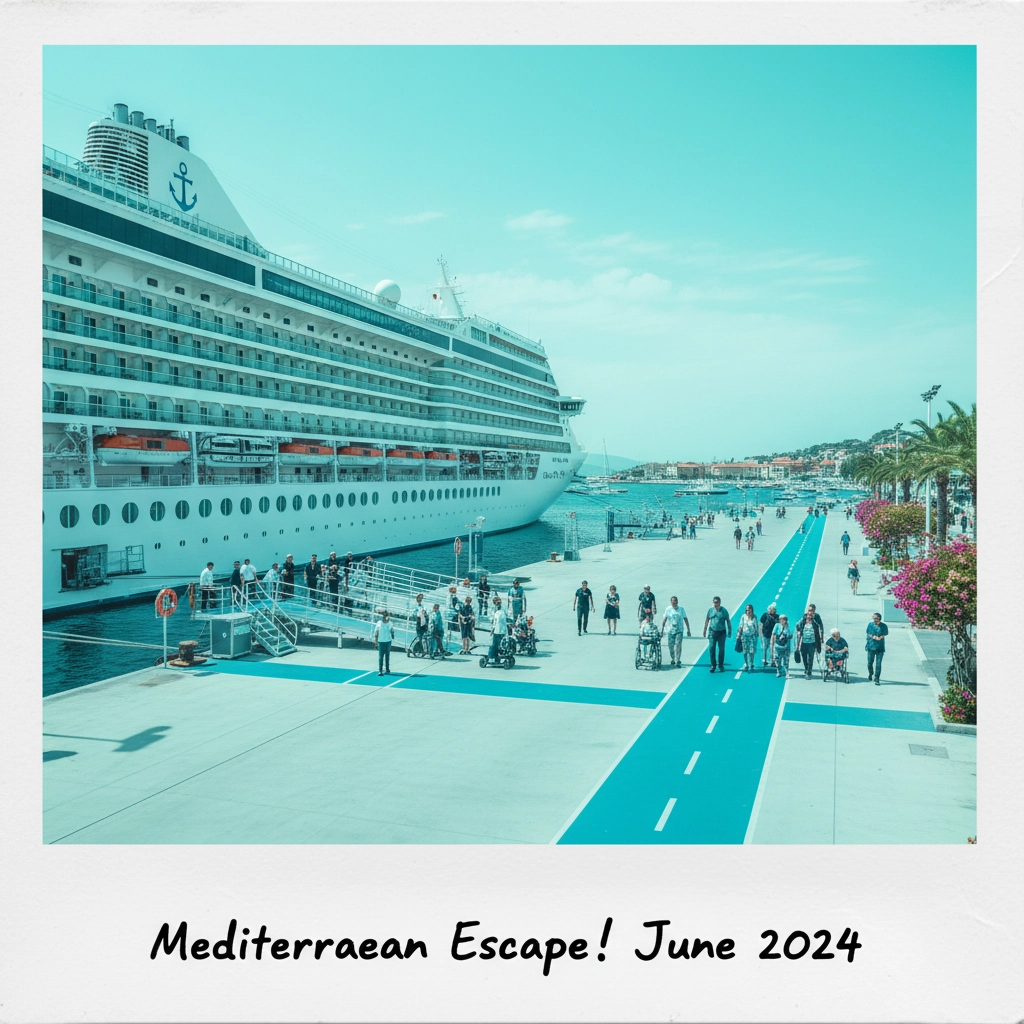What I Wish I'd Known Before Booking an Accessible Cruise

Booking your first accessible cruise can feel overwhelming, and honestly, there are quite a few things I wish someone had told me before I started planning. The good news is that cruising can be absolutely wonderful for travellers with accessibility needs: but getting it right requires knowing what to look for and when to book. Let me share some real insights that could save you both stress and disappointment.
The Golden Rule: Book Accessible Cabins Immediately
Here's the most important thing you need to know: accessible staterooms have extremely limited inventory, and they can sell out within the first few months of an itinerary becoming available. This isn't an exaggeration: it's the reality that catches many first-time accessible cruise bookers off guard.
Most cruise ships only have between 10-30 accessible cabins across all categories, compared to hundreds of standard rooms. Whether you need an interior, ocean view, balcony, or suite, that accessible version will likely be one of only 2-6 rooms of that type on the entire ship. The moment you know you want to cruise, you need to be ready to book.
Many cruise lines sell at least 2 years in advance, so do not leave booking a cruise to the last minute as you'll have no chance !!

Don't assume you can wait a few weeks to decide: by then, your options may have disappeared completely. This is particularly true for popular sailing dates, new ships, and shorter cruises where demand is highest.
Cabin Location Matters More Than You'd Think
When booking an accessible cabin, the location on the ship can make or break your experience. Many travellers focus solely on getting any accessible room without considering where it's positioned, but this can lead to some unpleasant surprises.
Accessible cabins placed too close to elevators will subject you to constant noise throughout the night: doors opening and closing, people talking in hallways, and the mechanical sounds of elevator operation. On the flip side, cabins positioned too far from elevators mean navigating longer distances through narrow corridors, often past housekeeping carts and other obstacles during busy daytime hours.
The sweet spot is usually mid-corridor, close enough to lifts for convenience but far enough away to avoid the noise. When booking, don't hesitate to ask your travel agent or the cruise line about the specific location of available accessible cabins.
Request Photos of Your Actual Room
One of the best pieces of advice I can give is to request photos of the specific accessible cabin you're booking, not just the generic promotional images. Accessible rooms can vary significantly in layout, even within the same category on the same ship.
Some accessible bathrooms have roll-in showers, while others have shower/tub combinations with grab bars. The positioning of beds, the amount of clear floor space, and the height of closet rails can all differ. By seeing your actual room in advance, you'll know exactly what to expect and can plan accordingly.
Most cruise lines are happy to provide these photos if you ask: it helps ensure you'll be satisfied with your accommodation, which benefits everyone involved.
Shore Excursions Need as Much Research as the Ship
Many first-time accessible cruise bookers focus exclusively on the ship's accessibility features without giving enough thought to what happens at each port. This can lead to disappointing days where you're stuck on the ship while others explore amazing destinations.

Shore excursion accessibility varies dramatically by destination and tour operator. A fully accessible ship becomes frustrating if you cannot disembark comfortably or participate in port activities. Some cruise terminals have excellent accessibility with level walkways and accessible shuttle services, while others might require navigating cobblestone streets or climbing stairs just to exit the port area.
Here's something many people don't realise: booking excursions directly through your cruise line (even if they cost slightly more) provides crucial protection. If your tour runs late, the ship will wait for you. Book independently at ports, and you risk being left behind if your tour encounters delays.
For groups of six or more, private excursions using accessible vans often provide much better flexibility and true accessibility compared to standard group tours. The extra cost is usually worth it for the personalised experience and peace of mind.
We can book accessible tours from many cruise ports around the world.
Plan Ahead for Special Services
Cruise lines can provide excellent support for various accessibility needs, but they require much more advance notice than you might expect.
This includes medical equipment storage, cabin alert kits for guests with hearing impairments, accessible tender boat arrangements for certain ports, and coordination with medical facilities onboard. The earlier you communicate your needs, the better the cruise line can prepare to accommodate them properly.
Don't assume that booking an accessible cabin automatically includes all the support services you might need: these usually require separate requests and confirmation.
Consider Ship Size and Cruise Line Culture
The size of your ship and the cruise line's overall atmosphere can significantly impact your experience. Smaller ships typically mean shorter distances to navigate onboard, which benefits anyone who cannot walk long distances or has mobility challenges. However, smaller ships usually cost more due to their luxury positioning and may have fewer accessible facilities overall.
Larger ships offer more accessible amenities: multiple accessible pools, more accessible dining venues, accessible entertainment options, and often better elevator systems. But you'll also be doing more walking and navigating through busier public spaces.
The cruise line's culture matters too. Some lines cater to families with lots of activities and noise, while others focus on quieter, more refined experiences. Consider what environment you'll be most comfortable spending a week or more in close proximity to other passengers.
Accessibility Goes Beyond Mobility
Modern cruise ships offer impressive accommodations for guests with hearing and visual impairments, but these features aren't always standard in every accessible cabin. Many ships provide closed-caption televisions, portable alert systems with bed vibrators for wake-up calls, strobe light alarm systems, and accessible casino tables with Braille or large-print cards.
Some cruise lines have crew members trained to provide verbal descriptions of shows for visually impaired guests, and assistive listening devices for theatre performances. However, these services typically require advance requests: they're not automatically provided just because you've booked an accessible cabin.
If you need any of these accommodations, make sure to discuss them specifically when booking and confirm them again before sailing.
The Reality of Accessible Cruising
Despite all these considerations, I want to emphasise that cruising can be absolutely wonderful for travellers with accessibility needs. Ships provide a level of accessibility that's often superior to land-based accommodations: accessible cabins, restaurants, entertainment venues, pools, and even tender boats for ports without accessible docks.
The key is knowing what to expect and planning accordingly. An accessible cruise that's well-planned in advance offers incredible value and experiences that can be difficult to replicate with other types of travel.
Most cruise staff are genuinely helpful and well-trained in accessibility assistance. From early boarding privileges to accessible shuttle buses in ports, cruise lines generally go above and beyond to ensure all guests have an enjoyable experience.
Making Your Accessible Cruise Dreams Reality
Planning an accessible cruise doesn't have to be overwhelming when you have expert guidance. The research, advance booking, and coordination required can feel daunting, but working with specialists who understand accessible travel makes all the difference.
At Altogether Travel, we've helped countless travellers navigate the complexities of accessible cruise booking. We know which cruise lines excel in accessibility, which ships have the best accessible facilities, and how to secure the accommodations and services you need well in advance.
Why not get in touch with us today? We can help you find the perfect accessible cruise that meets your specific needs, handle all the advance bookings and special requests, and ensure you're fully prepared for an amazing holiday. We look forward to hearing from you soon and helping make your accessible cruise dreams a reality.
The world of accessible cruising is waiting for you: let's make sure you experience it at its very best.
